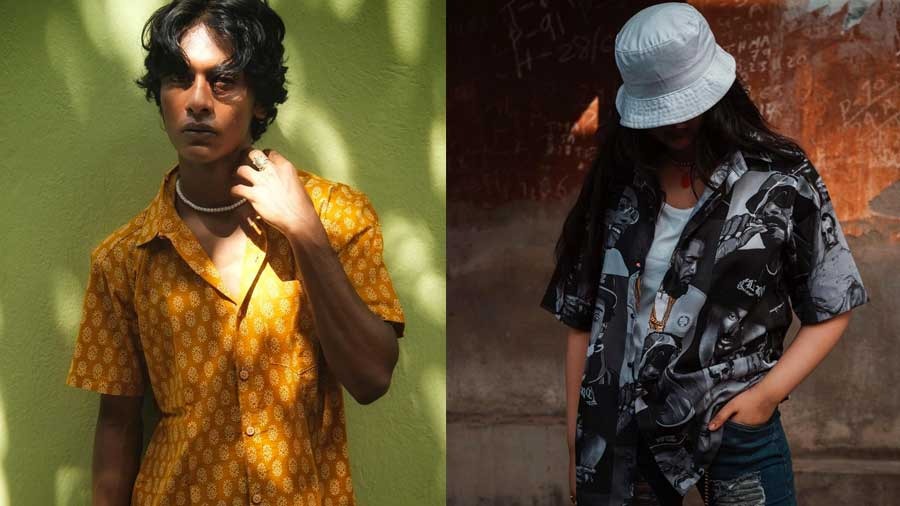As a child, Ankita Munshi would often wear her mother’s, father’s or grandfather’s clothes. When she went to college, her male friends would raid her wardrobe for clothes and accessories. This made her question the point of gender-specific clothing. “Why should a saree only be worn by a woman when it is just a long piece of fabric that we can present any way we want?” she wonders. Incorporating her training in textile design (from NIFT Hyderabad), she started her label Alluvial during the pandemic. The brand offers ready-to-wear fashion, incorporating Indian art that caters to a gender-free fashion space.
Munshi isn’t, of course, the only designer who feels this way. Several others are losing gender-specific categories from their line-ups as genderless and unisex fashion makes its presence felt in Kolkata.
Neko Boyz
For Diptangi Roy, co-founder of Neko Boyz, the goal has always been to provide sustainable fashion beyond gender binaries. “Growing up, I never felt completely comfortable with the conventional, cisgender norms in fashion. This led me to dissociate fashion from my gender. This was one of the main reasons behind experimenting with genderless upcycled fashion at Neko Boyz,” Roy shares.
Roy’s philosophy is simple — if someone likes a particular piece of clothing, they should be able to wear it irrespective of their gender or body type. “Popular culture and big multinational brands usually go by traditional norms, like certain clothing is only meant to be worn by certain body types, or only women can wear florals. The photos we post online make it evident that we don’t believe in wearing only what we are ‘supposed’ to wear, and that fashion should not be associated with gender,” Roy says.
Customisation has been key to her approach. Roy feels it has made the label more accessible to people with different body types. Despite this, common perceptions remain the biggest deterrent, she points out. “Sometimes, we receive DMs asking whether an item is for men or women when we post it without a model. I feel that is the way society is built. While the buzz around the item shows us that people are interested, societal perceptions often hold them back from making the purchase,” the designer adds.
ONN_Hold
Hiya Pal, who co-founded the size-inclusive label ONN_Hold, found herself at home in Kolkata during the lockdown and had some revelations about the homegrown streetwear space. “While I grew up as a plus-size woman, my co-founder is rather petite. We have both experienced problems trying to find the right sizes. In college (NIFT Delhi), I also interacted with members of the queer community and realised how clothes are a crucial aspect of everyone’s identity. Given our passion for streetwear, we decided to come up with our own unisex and size-inclusive brand,” Pal explains.
Presently, ONN_Hold only sells shirts, trousers and bags. This allows the label to cater to buyers more seamlessly, with a unit in Delhi and one in Bandel. “Our categories are limited, so we can develop our own prints and customise measurements according to the customer’s demands,” Pal adds.
2NAi
Srestha Bhattacharya, who founded the Instagram label 2NAi (after her daak naam), put her experience as a stylist to use to curate a sustainable clothing line. “When it comes to fashion, comfort has always been my priority. As a kid, I was more interested in men’s clothing and I have always wanted to introduce a brand that was meant for everyone,” Bhattacharya shares.
Bhattacharya, who always had a fascination for collecting unique objects, decided to extend this hobby to acquiring rejected clothing and refurbishing thrift items. “I am frequently asked if my fashion is for men since there isn’t a lot of awareness about unisex fashion among buyers, more so in Kolkata than in Mumbai. People don’t quite understand the possibilities of gender-fluid fashion yet,” she notes.
But Bhattacharya is optimistic about the new crop of labels that are committed to this approach. “The rise of independent genderless brands is great to witness and is definitely helping create awareness. While it is an evolving process, young people do care about what gender-fluid fashion represents and are not afraid to show it,” Bhattacharya smiles.
